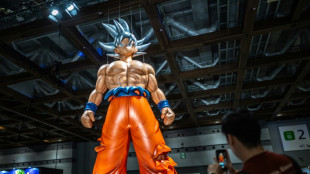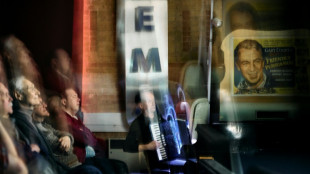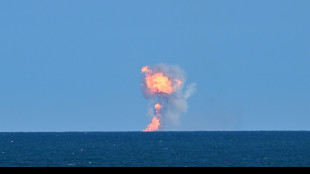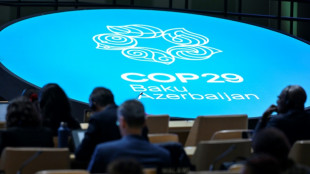
-
 'An inauspicious day': the landmines ruining Myanmar lives
'An inauspicious day': the landmines ruining Myanmar lives
-
UN to vote again on Gaza ceasefire, US plans unclear

-
 Japan's manga powerhouse 'Dragon Ball' turns 40
Japan's manga powerhouse 'Dragon Ball' turns 40
-
Japanese, Koreans bottom of global love life survey

-
 Son blames 'mistakes' after South Korea held by Palestine in qualifier
Son blames 'mistakes' after South Korea held by Palestine in qualifier
-
Japan ramps up tech ambitions with $65 bn for AI, chips

-
 Lights, action, melodrama! Silent films get new reel at London haven
Lights, action, melodrama! Silent films get new reel at London haven
-
Myanmar led world in landmine victims in 2023: monitor

-
 ICC to sentence Timbuktu war criminal
ICC to sentence Timbuktu war criminal
-
Ugandan opposition figure Besigye 'kidnapped', says wife

-
 Australia's Jason Day eyes more major glory after resurgence
Australia's Jason Day eyes more major glory after resurgence
-
Machu Picchu security boosted after visitors spread human ashes

-
 Popovic hails Australia character in 'crazy' World Cup qualifier
Popovic hails Australia character in 'crazy' World Cup qualifier
-
Taliban govt clearing 'un-Islamic' books from Afghanistan shelves

-
 Argentina beat Peru as Uruguay hold Brazil
Argentina beat Peru as Uruguay hold Brazil
-
Asian markets struggle as traders weigh geopolitical tensions

-
 Tatum stars as Celtics end Cavaliers unbeaten start
Tatum stars as Celtics end Cavaliers unbeaten start
-
Hurting India under pressure in blockbuster five-Test Australia series

-
 'They killed her dream': Israel strike leaves woman footballer in coma
'They killed her dream': Israel strike leaves woman footballer in coma
-
Iraq holds its first census in nearly 40 years

-
 Iraqis face tough homecoming a decade after IS rampage
Iraqis face tough homecoming a decade after IS rampage
-
Russian net tightens around last civilians left in eastern Ukraine

-
 Olympic champion Tebogo aims to inspire next generation of African athletes
Olympic champion Tebogo aims to inspire next generation of African athletes
-
Valencia on target as ten-man Ecuador upset Colombia

-
 'Rust' to premiere three years after on-set shooting
'Rust' to premiere three years after on-set shooting
-
Strike at French cognac maker Hennessy over measures in China spat

-
 Xi, Lula meet in Brasilia to 'enhance ties'
Xi, Lula meet in Brasilia to 'enhance ties'
-
SpaceX fails to repeat Starship booster catch, as Trump watches on

-
 'I have left a legacy': Nadal retires from tennis
'I have left a legacy': Nadal retires from tennis
-
US recognizes Venezuela opposition's Gonzalez Urrutia as 'president-elect'

-
 European powers, US seek to censure Iran at UN nuclear watchdog board
European powers, US seek to censure Iran at UN nuclear watchdog board
-
UNAIDS chief says husband, Ugandan opposition figure Besigye, 'kidnapped'

-
 Nadal's sensational career ends as Netherlands defeat Spain in Davis Cup
Nadal's sensational career ends as Netherlands defeat Spain in Davis Cup
-
US announces talks with Israel over civilian casualties in Gaza

-
 SpaceX fails to repeat Starship booster catch, as Trump looks on
SpaceX fails to repeat Starship booster catch, as Trump looks on
-
G20 summit ends with Ukraine blame game

-
 Trump appoints TV celebrity 'Dr. Oz' to key US health post
Trump appoints TV celebrity 'Dr. Oz' to key US health post
-
European stocks fall on Ukraine-Russia fears, US focused on earnings

-
 Last-gasp Szoboszlai penalty rescues Hungary draw with Germany
Last-gasp Szoboszlai penalty rescues Hungary draw with Germany
-
Germany, Netherlands draw as Nations League group stage ends

-
 Hong Kong tycoon Jimmy Lai takes witness stand in collusion trial
Hong Kong tycoon Jimmy Lai takes witness stand in collusion trial
-
Guardiola set to extend stay as Man City boss - reports

-
 Minnows Botswana hold Egypt to qualify with Mozambique, Tanzania
Minnows Botswana hold Egypt to qualify with Mozambique, Tanzania
-
Inter Miami coach Martino leaving club for 'personal reasons' - club source

-
 Chinese man sentenced to 20 months for Falun Gong harassment in US
Chinese man sentenced to 20 months for Falun Gong harassment in US
-
Hong Kong court jails 45 democracy campaigners, drawing condemnation

-
 'I did it for Rafa': Alcaraz after keeping Spain Davis Cup dream alive
'I did it for Rafa': Alcaraz after keeping Spain Davis Cup dream alive
-
Alcaraz keeps Spain and Nadal Davis Cup dream alive

-
 Trump names China hawk Howard Lutnick commerce secretary
Trump names China hawk Howard Lutnick commerce secretary
-
Europe's pivotal role in bid to strike COP29 climate deal


Pro-Russian vehicle convoys spark outrage in Germany
From shop fronts spattered with paint to insults thrown in the street, attacks on the Russian community in Germany have spiked since the start of the war in Ukraine.
As a result, some Russians have staged demonstrations "against Russophobia" in the form of vehicle convoys across the country, which has the largest Russian diaspora in the European Union.
But the demos have sparked a backlash, with many interpreting them as a show of support for Russia's military aggression in Ukraine.
Christian Freier, 40, has been sent hundreds of death threats a day since helping to organise a 400-strong vehicle convoy in Berlin last weekend, along with images of burnt and mutilated corpses.
The website of his car repair shop was hacked and his online ratings have plummeted.
"My life is hell," said Freier, who has both Russian and German citizenship.
The demonstration was largely peaceful and apolitical, though one woman was arrested for displaying the letter "Z", a symbol of support for the Russian army and now banned in Berlin.
"My aim was only to protest against the daily aggression suffered by Russians in Germany," Freier said, declining to answer any questions about the conflict itself.
Since Russia invaded Ukraine in February, 383 anti-Russian and 181 anti-Ukrainian crimes have been officially reported to German police.
Germany is home to around 1.2 million Russians and 325,000 Ukrainians, plus more than 316,000 who have arrived as refugees since the start of the conflict.
- 'Parade of shame' -
"All war is awful and can never be justified," said Rene Hermann, 50, who also helped to organise the Berlin convoy.
Hermann told AFP he has "no position" on the Ukraine conflict, but away from the scrutiny of journalists, he runs a blog on social network Tiktok with thousands of subscribers.
His account was recently suspended after he repeatedly spread pro-Kremlin propaganda, including allegations that Kyiv had staged a massacre "to manipulate Western thinking".
"The motives for taking part in these demonstrations are very diverse," said Jochen Toepfer, a sociologist at the Otto-von-Guericke University in Magdeburg and an expert on Russian society.
"They were organised as demonstrations against discrimination in Germany. But there were certainly also fans of (Russian President Vladimir) Putin, as well as people who don't necessarily like Putin but don't want to see their country discredited, despite the war," he told AFP.
Though it was billed as apolitical, the Berlin demo provoked a wave of indignation in Germany, with the Bild daily calling it a "parade of shame".
"For heaven's sake, how could you allow this convoy of shame in the middle of Berlin?" the Ukrainian ambassador to Germany, Andrij Melnyk, asked of Berlin mayor Franziska Giffey.
Giffey replied that she understood his anger but could not penalise people for merely waving Russian flags.
- Imported war? -
The security authorities are "closely monitoring the extent to which Russian, but also Ukrainian, citizens are at risk in Germany," German Interior Minister Nancy Faeser said last week.
"We must be very careful that this war is not imported into our society," she added.
That is unlikely to happen, according to Tobias Rupprecht, a postdoctoral researcher at the Free University of Berlin.
"Most Russians here have a much more critical view of the conflict and tend to be much more Westernised than Russians in Russia," he said.
However, "the longer the war goes on, the greater the risk that more crimes will be committed in this context in Germany", according to Toepfer.
Several more pro-Russian demonstrations have been planned for Sunday in Germany, prompting condemnation from Russian organisations.
"We will not tolerate a few cases of discrimination being used as a cover for pro-Putin propaganda events," warned the IDRH, a society for people of Russian origin in the state of Hesse.
A.Moore--AT
